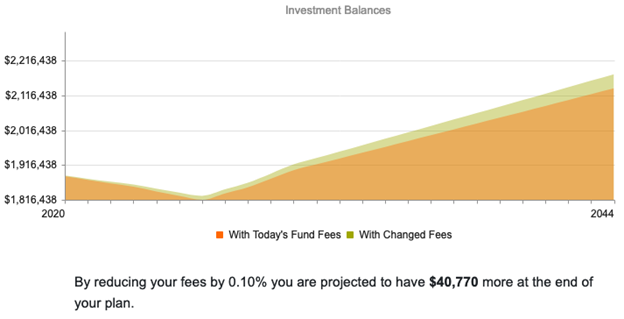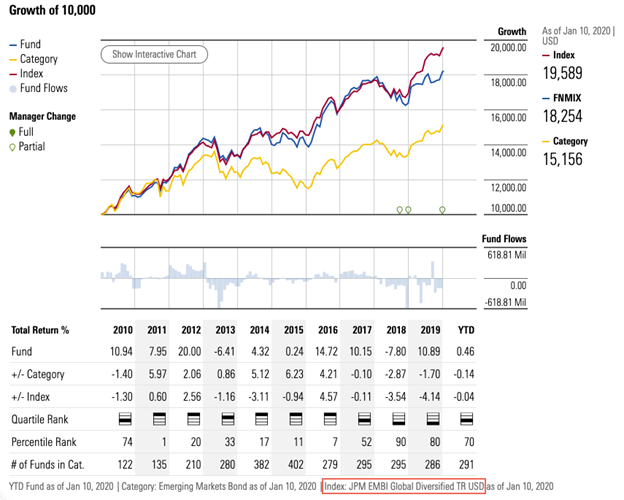Key Points:
- High fees can take a big bite out of your investments.
- Index funds, with low fees and passive management, normally outperform their more expensive, actively managed peers over time.
- It's a good idea to review your investments on an annual basis to make sure fees are reasonable and asset class balances are where you want them.
"Gentlemen, you must recognize (1) that companies having the smallest expense will have the ultimate advantage; (2) that companies having this advantage are the most desirous of correcting present abuses, and (3) that companies which cannot long survive the present condition of affairs are determined to nullify every effort for reform. To save our business from ruin we must at once undertake a vigorous reform. To do this, the first step must be to reduce expenses."
--Jack Bogle, on receiving the Special Achievement Award of the National Association of Personal Financial Advisors, 1999
A year ago this month, the founder of the Vanguard Group, Jack Bogle, passed away. Whether you know it or not, you probably owe Bogle a debt. Vanguard was--and still is--at the forefront bringing mutual fund and exchange-traded fund (ETF) fees down. (And earlier this month, Vanguard joined other major industry players in offering free stock trades as well, though we're not sure how Bogle would feel about that move.) According to Morningstar, the average stock index fund investor is paying about 40% less in fees than they did 10 years ago. Even if you don't have any investments with Vanguard, they're the ones who set the pace on this issue. Other fund companies have had to follow suit or risk losing business.
It's not just the fee part of that equation that's important, either. The index-fund investment part of it may be even more so. Also according to Morningstar, the percentage of mutual fund assets in index funds has almost doubled over that same 10-year period. Over time, index funds win out over actively managed funds. You might have an actively managed fund with a market-beating hot hand for even a few consecutive years, but the chances of that continuing over a time span of any length while you're an investor in that fund are infinitesimal. The combination of stock picking (which is hard) and higher fees (to pay the managers who are picking those stocks) makes active management an uphill battle.
Fresh Starts
The start of the new year is a natural time to review your investments for a number of reasons. Are you still invested, proportionally speaking, in the asset classes you want to be invested in? It could be time to do some rebalancing if certain investments have performed well while others have lagged. Are your goals still the same as they were the last time you reviewed your investments? Do you have substantially different financial needs now?
Here are a couple of other things you may want to look at heading into 2020.
The fees you're paying. At this point in time, there's simply no reason to hold expensive funds--that is, funds that charge high annual fees. You're not always going to be able to have Vanguard-like investments with 0.04% expense ratios, but you should do your best to get close. Fees kill, or at least maim, investment performance over time.

WealthTrace can help you understand how lower fees on your investments might help you reach your goals faster.
Let's take a high-level look at what lower fees can mean for a plan. In this example, we're looking at a portfolio that is already pretty lean, in that it's largely made up of Fidelity, Vanguard, and iShares funds and ETFs. These companies (iShares is a BlackRock brand) have reputations for high quality and low fees, so we're starting from a pretty good place already.

WealthTrace gives you important data on your investments' fees.
In this example, we're only showing the first few funds in a portfolio. We've ranked the funds from highest expense ratio to lowest. Some of the cheapest, not shown here, are in the .04% - .06% range (thank you, Jack Bogle). But as you can see, we have some in the 1% range. That's not necessarily bad, depending on what the fund is invested in and trying to achieve. Two of the top three funds here are internationally focused. Costs are thus higher: Trading costs, travel costs for the managers if the fund is actively managed, possibly maintaining offices overseas, and other overhead can add up.
Better alternatives to what you own. So are there any better (by which we mostly mean cheaper) options than those Fidelity funds? It takes a little bit of work to find out, but it's work that could pay off in a big way.
The first thing to know is whether the fund in question is an index fund or not. For the most part, perhaps even exclusively, index funds are what you're going to want to own.
Fidelity New Markets Income Fund FNMIX, the last fund listed above, is not an index fund, and charges what looks at least on the surface like a hefty expense ratio. So we want to know (1) what index gets closest to what this fund is trying to accomplish, and (2) whether that index investable in the form of a mutual fund or ETF.
Morningstar is always a good place to find information about funds and ETFs. If we look at the FNMIX page, we can see some performance history as well as the index the fund is most correlated with (see bottom right).

"JPM EMBI Global Diversified TR USD" translates to "J.P. Morgan Emerging Markets Bond Index Global Diversified Total Return US Dollar." That's our index--and, based on the graph above, it looks like the index has beaten the fund, at least over the past 10 years.
Can we invest in the index? It's normally possible to invest in a fund or ETF that tries to mimic an index, but not always. In this case, we can: An iShares ETF called iShares JP Morgan USD Emerging Markets Bond, with the ticker EMB. Its expense ratio? 0.39%, or less than half what you would pay with an investment in FNMIX. All else equal, ENB is going to be a preferable investment to FNMIX.
An Annual Reckoning
There are other things to consider before making a trade, of course, like the tax ramifications of selling one fund to get into the other. But don't let a short-term, one-time tax hit keep you from cutting fees that you would otherwise pay year in and year out. And as you add new investments to your portfolio, start with two questions: Is it an index fund, and is it cheap? That's what Jack Bogle would do.
What are your investments costing you? Are there better options? Sign up for a free trial of WealthTrace to find out.